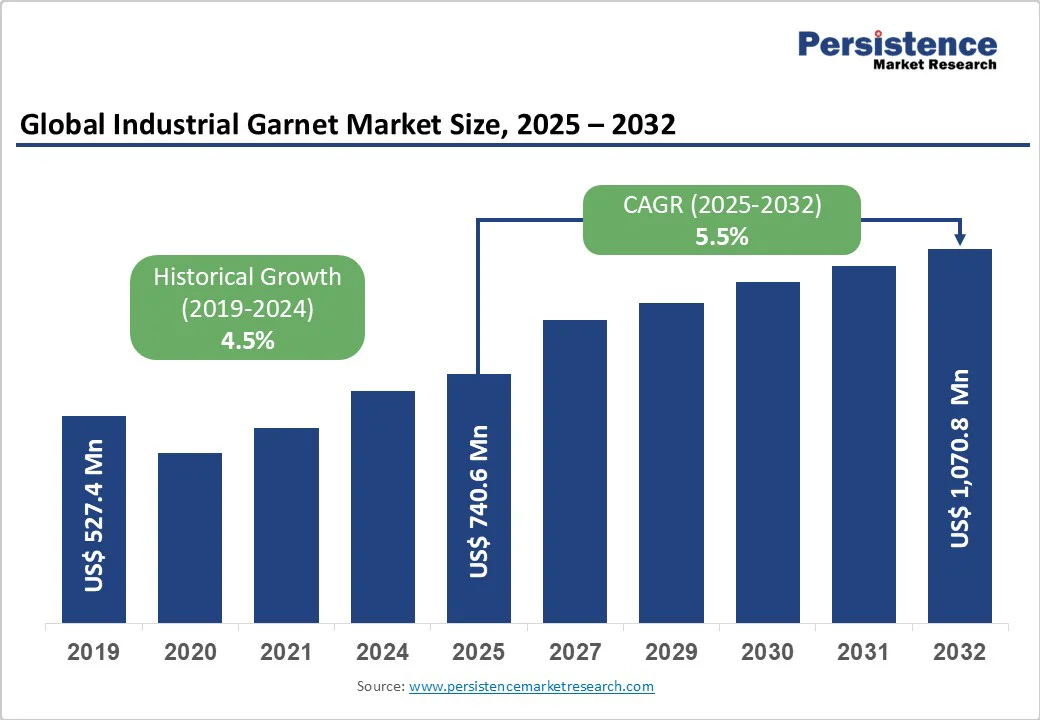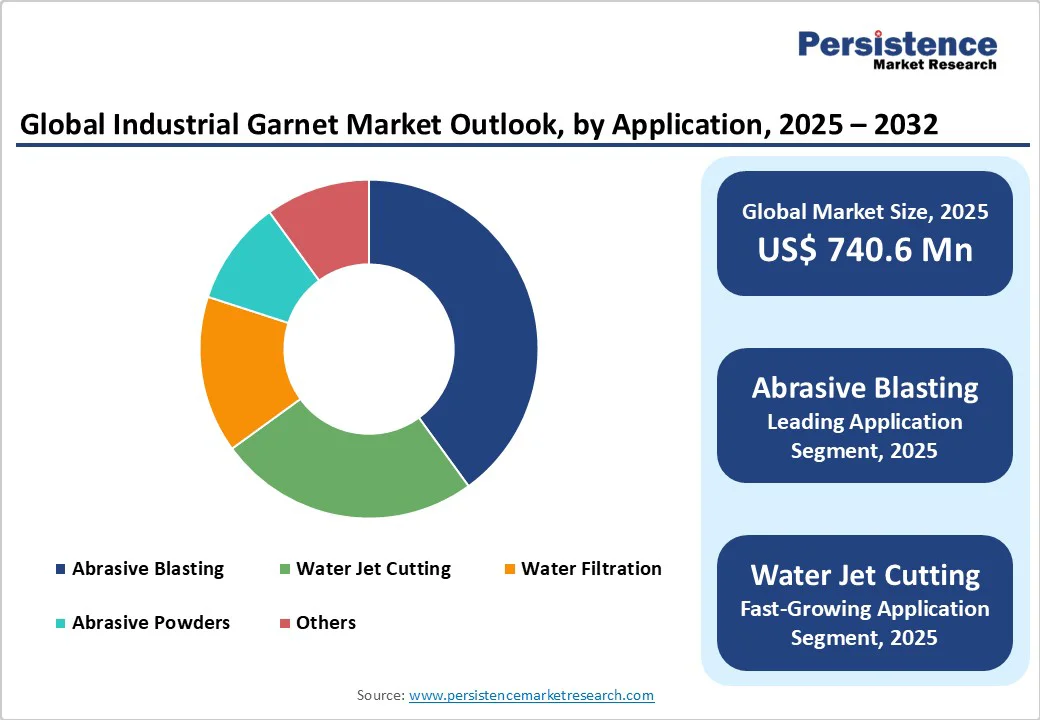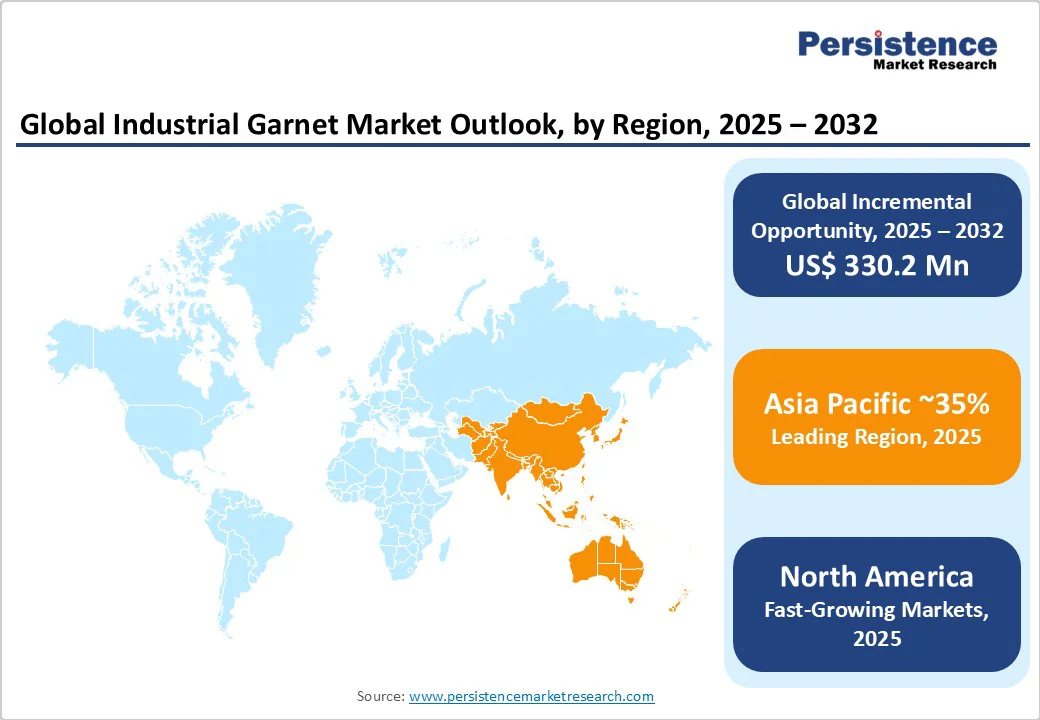ID: PMRREP11794| 188 Pages | 20 Oct 2025 | Format: PDF, Excel, PPT* | Chemicals and Materials

The global industrial garnet market is likely to be valued at US$740.6 million in 2025. It is projected to reach US$1,070.8 million by 2032, growing at a CAGR of 5.5% during the forecast period 2025 - 2032, on account of the increasing adoption of advanced waterjet cutting technologies, which utilize garnet as a highly efficient abrasive, and growing awareness of sustainable and eco-friendly abrasives that enhance industrial processes.
Key end-use industries such as manufacturing and construction are leveraging these properties to achieve higher precision and environmental compliance. Regionally, the Asia Pacific is leading the market, supported by rapid industrialization across India and China, which are seeing burgeoning demand for garnet in various abrasive applications due to expanding industrial and infrastructure activities.
| Key Insights | Details |
|---|---|
| Industrial Garnet Market Size (2025E) | US$740.6 Mn |
| Projected Market Value (2032F) | US$1,070.8 Mn |
| Global Market Growth Rate (CAGR 2025 to 2032) | 5.5% |
| Historical Market Growth Rate (CAGR 2019 to 2024) | 4.5% |

One of the primary growth drivers for the industrial garnet market is the increasing use of garnet in the waterjet cutting industry. Garnet's superior hardness, durability, and non-toxic nature make it an ideal abrasive for waterjet cutting applications, particularly in sectors such as automotive, aerospace, and metal fabrication.
As industries automate and continue to adopt precision cutting technologies for materials such as steel, aluminum, glass, and composites, the demand for garnet as an efficient, environmentally friendly abrasive is expected to grow. Waterjet cutting offers advantages such as high precision, no heat-affected zones, and the ability to cut a wide range of materials, which fuels the need for garnet.
The growing demand for industrial garnet is also closely tied to infrastructure development and construction activities across the globe. In construction, garnet is widely used for surface preparation, abrasive blasting, and cutting materials such as steel and concrete.
Industrial garnet is favored for its ability to deliver high-quality surface finishes while being more efficient and less environmentally harmful. As governments and private sectors invest in building smart cities, energy infrastructure, and transportation systems, the market is expected to witness robust growth, driven by its essential role in construction-related processes.
One of the key restraints for the industrial garnet market growth is the fluctuating availability of raw materials. Leading suppliers of industrial garnets, including those from India and Australia, dominate global production. Political instability, export restrictions, and changes in mining regulations in these regions can lead to disruptions in the supply chain, impacting garnet availability.
Garnet mining operations can face environmental challenges, including the need to adhere to strict sustainability and conservation measures. The dependency on a limited number of suppliers increases vulnerability, making the market prone to instability due to geopolitical or environmental factors.
Another significant restraint for the market is its relatively high cost compared to alternative abrasives such as silica sand, aluminum oxide, and slags. Although garnet offers superior performance and environmental benefits, its high price point may deter cost-sensitive industries from adopting it, particularly in developing regions.
This price sensitivity can limit the adoption of garnet in applications where alternatives, despite being less efficient or more hazardous, are more economical. The need to balance performance with cost considerations creates a barrier for garnet, especially in highly competitive industries such as construction.
As environmental regulations become more stringent across industries, the demand for eco-friendly and sustainable abrasives is on the rise. Industrial garnet, recognized for its non-toxic, non-reactive, and recyclable properties, is increasingly being adopted as an alternative to hazardous substances such as silica sand and coal slag.
The shift toward sustainable practices presents a significant opportunity for garnet producers to capture market share, particularly in regions with stringent environmental standards, such as North America and Europe. As companies seek to lower their ecological footprints and comply with green regulations, industrial garnet’s environmental benefits, such as lower dust generation and recyclability, provide a transformative opportunity.
The rise of advanced manufacturing technologies, particularly in the waterjet cutting industry, presents a transformative opportunity for the market. Waterjet cutting, which relies heavily on garnet for its abrasive properties, is gaining traction across sectors such as aerospace, automotive, and electronics for its precision and efficiency.
As manufacturers adopt automated and high-precision cutting systems, the demand for premium garnet abrasives is expected to increase. This trend opens up opportunities for garnet suppliers to develop and offer specialized garnet grades tailored to meet the evolving needs of high-tech industries.
Almandine garnet commands the dominant position in the industrial garnet market, holding an estimated 53% share in 2025, making it the most commercially significant variety across all industrial applications.
This leadership is fundamentally driven by almandine's superior physical properties, particularly its exceptional hardness as measured on the Mohs scale, which renders it highly effective for demanding abrasive operations, including surface preparation, cutting, and polishing.
Characterized by its deep red to brownish-red coloration, almandine is predominantly composed of iron-aluminum silicate, offering optimal durability and resistance to weathering that ensures consistent performance across extended operational cycles.
Almandine's market dominance is particularly pronounced in abrasive blasting applications, where it accounts for the overwhelming majority of garnet consumption in metalworking, shipbuilding, oil and gas pipeline maintenance, and industrial fabrication sectors.
Spessartine garnet represents the fastest-growing product type segment from 2025 to 2032, driven primarily by expanding applications in the construction and metalworking sectors, where spessartine's distinct orange to reddish-brown coloration and unique manganese-aluminum silicate composition provide specialized performance characteristics increasingly valued in surface preparation and refractory material applications.
The rising prominence of this product is closely tied to global construction sector expansion, particularly in the Asia Pacific and Middle Eastern markets, where infrastructure modernization projects require high-performance abrasives for concrete surface preparation, coating removal, and finishing operations on structural steel and architectural metalwork.
Abrasive blasting is expected to continue dominating the industrial garnet market, with a projected 39.5% share in 2025. This leadership position is underpinned by garnet's exceptional hardness, durability, and low dust emission characteristics, which make it particularly effective for surface preparation across critical industries, including metalworking, shipbuilding, oil and gas pipeline maintenance, and industrial fabrication.
The segment's dominance stems from Garnet's ability to efficiently remove surface coatings, rust, and contaminants while ensuring thorough surface preparation, a requirement essential for subsequent coating adhesion and structural integrity in heavy industrial applications.
Industrial garnet, particularly the almandine variety, offers superior recyclability compared to traditional abrasives such as silica sand, making it a cost-effective solution that can be reused multiple times without significant performance degradation.
Water jet cutting is expected to remain the fastest-growing application segment through 2032, driven by the increasing adoption of precision manufacturing technologies across the automotive, aerospace, metal fabrication, glass shaping, and stone cutting industries, where garnet's superior cutting efficiency and material integrity preservation are highly valued.
The segment's expansion is closely linked to advances in waterjet cutting machinery, which leverage garnet's hardness to achieve intricate cuts without generating heat-affected zones.
This is a critical advantage when processing heat-sensitive materials such as composites, aluminum, and advanced alloys used in electric vehicle components and aircraft structures. The automotive industry's shift toward lightweight materials and the aerospace sector's demand for precision component manufacturing are also creating substantial opportunities for garnet-enhanced waterjet cutting applications.

Asia Pacific commands the largest region industrial garnet market share, estimated at approximately 40% in 2025, and is simultaneously positioned as the fastest-growing region with a projected CAGR of 6.5% during 2025 - 2032.
This dual leadership stems from the region's unprecedented industrialization pace, particularly in manufacturing powerhouses such as China and India, which collectively drive substantial demand for high-performance abrasive materials across construction, automotive, shipbuilding, and metalworking sectors.
China's dominance in global manufacturing, accounting for over 28% of world production, creates massive consumption of industrial garnet for both abrasive blasting in surface preparation and waterjet cutting in precision component fabrication.
India's burgeoning infrastructure development, supported by government initiatives such as Make in India and extensive road, rail, and port construction projects, further amplifies regional demand for garnet in surface treatment and cutting applications.
North America holds the second-largest regional market share at approximately 27.5% in 2025, with the United States serving as the dominant contributor. The regional market is projected to grow at a steady CAGR through 2032, driven by robust demand from waterjet cutting, abrasive blasting, and water filtration applications across advanced manufacturing, aerospace, automotive, and construction sectors.
The U.S. maintains leadership in industrial garnet production and consumption due to its sophisticated technology infrastructure, particularly in precision manufacturing and advanced materials processing.
Key growth drivers include expanding investments in infrastructure modernization under federal programs, the construction sector's recovery and expansion, and increasing adoption of eco-friendly technologies aligned with stringent Environmental Protection Agency (EPA) regulations. The aerospace and defense industries, concentrated in the U.S., require high-precision waterjet cutting for advanced alloys and composite materials, sustaining premium garnet demand.
Europe accounts for approximately 22% in 2025, reflecting the region's mature yet stable industrial base. Key markets include Germany, the United Kingdom, France, and Spain, which collectively drive demand through well-established automotive, aerospace, construction, and manufacturing sectors.
Germany's position as Europe's manufacturing leader, particularly in automotive and precision engineering, sustains significant garnet consumption for waterjet cutting and surface preparation applications.
Regional market growth is fundamentally shaped by the European Union (EU)'s stringent sustainability mandates, including the Green Deal and circular economy directives, which favor garnet as an environmentally responsible abrasive alternative to silica-based materials. Europe's regulatory harmonization has accelerated the adoption of non-toxic, recyclable abrasives across industrial operations, with garnet meeting both performance and compliance requirements.

The global industrial garnet market is competitive with key players including GMA Garnet Group, Indian Ocean Garnet Sands Company (IOGS), Barton International, and VV Mineral dominating global supply.
These companies hold significant market share due to their extensive mining capabilities and distribution networks. GMA Garnet, in particular, is a leading global supplier focusing on high-quality garnet for abrasive and waterjet cutting applications. Small regional players also compete, offering cost-effective alternatives, especially in emerging markets.
The market is characterized by strategic partnerships, mergers, and acquisitions, with companies aiming to expand their geographic presence and product portfolios. The emphasis on sustainability and eco-friendly abrasives is driving innovation and product differentiation among competitors.
The global industrial garnet market is estimated to reach US$ 740.6 million in 2025.
The growing use of garnet as an abrasive material in applications such as waterjet cutting, abrasive blasting, and filtration across various industries drives the market.
The industrial garnet market is poised to witness a CAGR of 5.5% from 2025 to 2032.
Strengthening demand for eco-friendly and sustainable abrasives and widening deployment of advanced manufacturing technologies are key market opportunities.
The key market players are Indian Ocean Garnet Sands, Barton International, Opta Minerals, V.V. Mineral and Almandine Garnet Processing.
| Report Attribute | Details |
|---|---|
| Historical Data/Actuals | 2019 - 2024 |
| Forecast Period | 2025 - 2032 |
| Market Analysis Units | Value: US$ Mn, Volume: Units |
| Geographical Coverage |
|
| Segmental Coverage |
|
| Competitive Analysis |
|
| Report Highlights |
|
By Product Type
By Application
By Region
Delivery Timelines
For more information on this report and its delivery timelines please get in touch with our sales team.
About Author